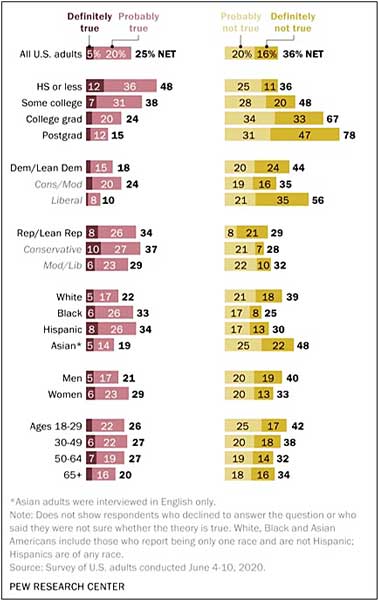 |
| Willy Wonka (Gene Wilder) conspiracy meme (from www.memecreator.org). |
Here’s the plan. I’ll review highlights and examples and provide links should you wish to explore further.
Effect of Political Persuasion
Last May, YouGov conducted a survey of 1,640 U.S. adult residents for Yahoo News, asking about COVID-19 conspiracy theories circulating on the internet. The results showed strong political divides.
For example, 57% of Republicans believed that Chinese scientists engineered the coronavirus in a lab from which it accidentally escaped; 23% of Democrats believed it true. Similarly, twice as many Republicans as Democrats thought COVID-19 was intentionally created by Chinese scientists as a bio-warfare weapon (42% vs 21%). Independents fell in between, though closer to Democrats.
 |
| Percentage of Democrats (blue dot), Independents (yellow) and Republicans (red) that think the statements are true (from today.yougov.com/topics/politics/articles-reports/2020/05/26/republicans-democrats-misinformation). |
Effect of Demographics
If Bill Gates’s microchips didn’t get your attention, how about this one: Powerful people intentionally planned the coronavirus outbreak. The Pew Research Center conducted a survey last June and found that 71% of Americans had heard of that conspiracy theory (somehow, I missed it). Of the 71%, 20% said it’s probably true and 5% said it’s definitely true.
 |
| Percentage of U.S. adults that think the COVID-19 outbreak was planned by powerful people (from www.pewresearch.org/fact-tank/2020/07/24/a-look-at-the-americans-who-believe-there-is-some-truth-to-the-conspiracy-theory-that-covid-19-was-planned/). |
Black and Hispanic responders were more likely than White or Asian Americans to believe the theory (33% and 34% vs. 22% and 19%), and women were more likely than men to see some truth in the theory (29% vs.21%).
I should add that 34% of Republicans or those leaning Republican believed the theory, compared to 18% of Democrats and Democratic leaners.
Effect of “News” Source
McGill University researchers compared a massive number of tweets with articles published by 19 Canadian traditional news sites. Traditional news covered and encouraged public health recommendations more frequently, while misinformation appeared more frequently on Twitter.
To evaluate the impact, the researchers conducted a nationally representative survey that included questions about common COVID-19 misperceptions, risk perceptions, social distancing and exposure to traditional news and social media. They found social media exposure was associated with more misperceptions and less social distancing compliance.
As for conspiracy, there was much more content on Twitter that described the pandemic itself as a conspiracy or a hoax.
| Percentage of COVID-19 content on traditional news versus Twitter that describes the pandemic as a conspiracy or hoax (content that shared misinformation in red; content that debunked misinformation in green) and content that provides public health recommendations (from misinforeview.hks.harvard.edu/article/the-causes-and-consequences-of-covid-19-misperceptions-understanding-the-role-of-news-and-social-media/). |
Thanks for stopping by.
P.S.
Yahoo News/YouGov survey: today.yougov.com/topics/politics/articles-reports/2020/05/26/republicans-democrats-misinformation
Pew Research Center survey: www.pewresearch.org/fact-tank/2020/07/24/a-look-at-the-americans-who-believe-there-is-some-truth-to-the-conspiracy-theory-that-covid-19-was-planned/
Gender difference in conspiracy theory endorsement:
www.cambridge.org/core/journals/politics-and-gender/article/gender-differences-in-covid19-conspiracy-theory-beliefs/11E1C0AA1837CFA7E3926F5E9AF30782
www.eurekalert.org/pub_releases/2020-07/uod-mam072420.php
Effect of news source:
misinforeview.hks.harvard.edu/article/the-causes-and-consequences-of-covid-19-misperceptions-understanding-the-role-of-news-and-social-media/
eurekalert.org/pub_releases/2020-07/mu-csm072920.php
Debunking COVID-19 conspiracy theories:
www.politifact.com/article/2020/jan/24/fact-checking-hoaxes-and-conspiracies-about-corona/
allianceforscience.cornell.edu/blog/2020/04/covid-top-10-current-conspiracy-theories/


No comments:
Post a Comment